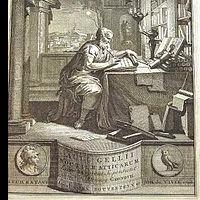Gellius VIII: Vinum, Reditiones, Colloquium Poetarum
XI.14. Sobria et pulcherrima Romuli regis responsio circa vini usum. I. Simplicissima suavitate et rei et orationis L. Piso Frugi usus est in primo annali, cum de Romuli regis vita atque victu scriberet. II. Ea verba, quae scripsit, haec sunt: "Eundem Romulum dicunt ad cenam vocatum ibi non multum bibisse, quia postridie negotium haberet. Ei dicunt: "Romule, si istuc omnes homines faciant, vinum vilius sit". His respondit: "immo vero carum, si, quantum quisque volet, bibat; nam ego bibi quantum volui". XII.8 Reditiones in gratiam nobilium uirorum memoratu dignae.
[1] P. Africanus superior et Tiberius Gracchus, Tiberii et C. Gracchorum pater, rerum gestarum magnitudine et honorum atque uitae dignitate inlustres uiri, dissenserunt saepenumero de republica et ea siue qua alia re non amici fuerunt. [2] Ea simultas cum diu mansisset et sollemni die epulum Ioui libaretur atque ob id sacrificium senatus in Capitolio epularetur, fors fuit, ut aput eandem mensam duo illi iunctim locarentur. [3] Tum quasi diis inmortalibus arbitris in conuiuio Iouis optimi maximi dexteras eorum conducentibus repente amicissimi facti. Neque solum amicitia incepta, sed adfinitas simul instituta; [4] nam P. Scipio filiam uirginem habens iam uiro maturam ibi tunc eodem in loco despondit eam Tiberio Graccho, quem probauerat elegeratque exploratissimo iudicii tempore, dum inimicus est. [5] Aemilius quoque Lepidus et Fuluius Flaccus nobili genere amplissimisque honoribus et summo loco in ciuitate praediti odio inter sese graui et simultate diutina conflictati sunt. [6] Postea populus eos simul censores facit. Atque illi, ubi uoce praeconis renuntiati sunt, ibidem in campo statim nondum dimissa contione ultro uterque et pari uoluntate coniuncti complexique sunt exque eo die et in ipsa censura et postea iugi concordia fidissime amicissimeque vixerunt.
XIII.2. Super poetarum Pacuvii et Accii conloquio familiari in oppido Tarentino. I. Quibus otium et studium fuit vitas atque aetates doctorum hominum quaerere ac memoriae tradere, de M. Pacuvio et L. Accio tragicis poetis historiam scripserunt huiuscemodi: II. "Cum Pacuvius" inquiunt "grandi iam aetate et morbo corporis diutino adfectus Tarentum ex urbe Roma concessisset, Accius tunc haut parvo iunior proficiscens in Asiam, cum in oppidum venisset, devertit ad Pacuvium comiterque invitatus plusculisque ab eo diebus retentus tragoediam suam, cui Atreus nomen est, desideranti legit. III. Tum Pacuvium dixisse aiunt sonora quidem esse, quae scripsisset, et grandia, sed videri tamen ea sibi duriora paulum et acerbiora. IV. "Ita est," inquit Accius "uti dicis; neque id me sane paenitet; meliora enim fore spero, quae deinceps scribam. V. Nam quod in pomis est, itidem" inquit "esse aiunt in ingeniis; quae dura et acerba nascuntur, post fiunt mitia et iucunda; sed quae gignuntur statim vieta et mollia atque in principio sunt uvida, non matura mox fiunt, sed putria. VI. Relinquendum igitur visum est in ingenio, quod dies atque aetas mitificet".

